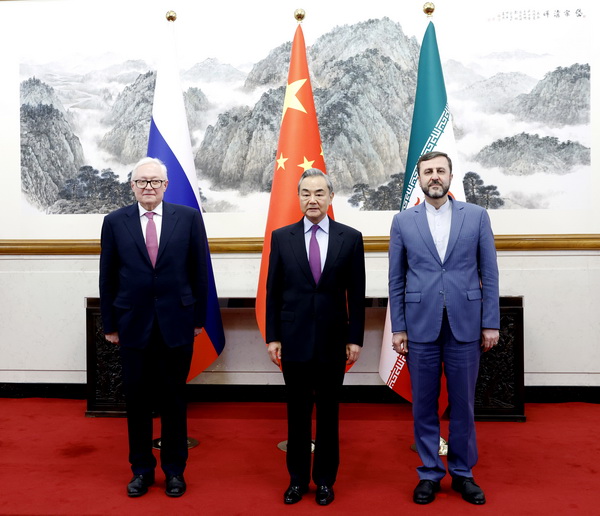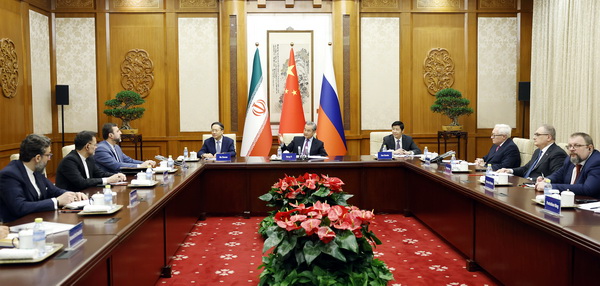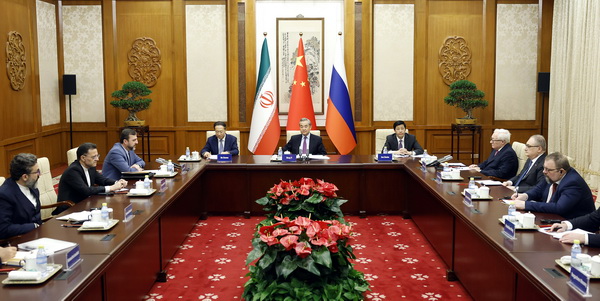
People’s Republic of China


On March 14, 2025, Member of the Political Bureau of the CPC Central Committee and Foreign Minister Wang Yi met in Beijing with Deputy Foreign Minister Ryabkov Sergey Alexeevich of the Russian Federation and Deputy Foreign Minister Kazem Gharibabadi of the Islamic Republic of Iran who attended the Beijing meeting between China, Russia and Iran on the Iranian nuclear issue.
Wang Yi said that over the past year or so, tensions in the Middle East have continued to escalate, with the regional security situation deteriorating significantly and hotspot issues emerging one after another. As a responsible major country, China remains committed to the political settlement of regional hotspots, the maintenance of peace and stability in the Middle East, and the support of unity and self-reliance among regional countries. There are enough issues in the Middle East, and all parties should focus on addressing the Israeli-Palestinian conflict, an unresolved historical injustice lingering since World War II, rather than creating new tensions or even crises.
Wang Yi said that the Joint Comprehensive Plan of Action (JCPOA) is a significant achievement in addressing sensitive issues through dialogue and negotiation. It represents a successful practice of pursuing multilateralism and has played a unique and important role in maintaining regional stability and upholding the international nuclear non-proliferation regime. Regrettably, the implementation of the JCPOA was disrupted due to the U.S. unilateral withdrawal. The situation has now reached another critical juncture. Wang Yi emphasized the need to gain time for peace by resolving disputes through political and diplomatic means, while opposing the use of force and illegal sanctions. It is essential to uphold international rules, safeguard the integrity of the nuclear non-proliferation regime, appreciate Iran's commitment to not developing nuclear weapons, and respect its right to the peaceful uses of nuclear energy. Efforts should be made to expand consensus and seek a reasonable solution through negotiations that accommodates the legitimate concerns of all parties.

Wang Yi said that the vice foreign ministers of the three countries successfully held a meeting in Beijing on the Iranian nuclear issue and issued a joint statement, marking an important step in the right direction. China will also strengthen communication with other parties involved in the Iranian nuclear issue, encourage them to demonstrate political sincerity and return to talks at an early date. Peace remains within reach and should not be easily abandoned. Unilateral sanctions will only escalate tensions, while dialogue and negotiation remain the only right way forward.
Wang Yi proposed China's five points on the proper settlement of the Iranian nuclear issue. First, stay committed to peaceful settlement of disputes through political and diplomatic means, and oppose the use of force and illegal sanctions. Second, stay committed to balancing rights and responsibilities, and take a holistic approach to the goals of nuclear nonproliferation and peaceful uses of nuclear energy. Third, stay committed to the framework of the JCPOA as the basis for new consensus and resume dialogue and negotiation as early as possible. Fourth, stay committed to promoting cooperation through dialogue, and oppose pressing for intervention by the U.N. Security Council (UNSC). Initiating the snapback mechanism must be handled with caution. Fifth, stay committed to a step-by-step and reciprocal approach, and seek consensus through consultation. As a permanent member of the UNSC and a party to the JCPOA, China will stay in communication and coordination with all relevant parties, actively promote talks for peace, and play a constructive role in realizing early resumption of talks.
Ryabkov Sergey Alexeevich and Kazem Gharibabadi expressed gratitude to China for hosting the Beijing meeting, highly commended China's constructive role, and spoke positively of the outcomes of the meeting. They expressed their willingness to maintain dialogue and cooperation while seeking a political and diplomatic solution to the Iranian nuclear issue. Russia and Iran are willing to maintain and strengthen communication and coordination with China within multilateral frameworks such as BRICS and the Shanghai Cooperation Organization.




